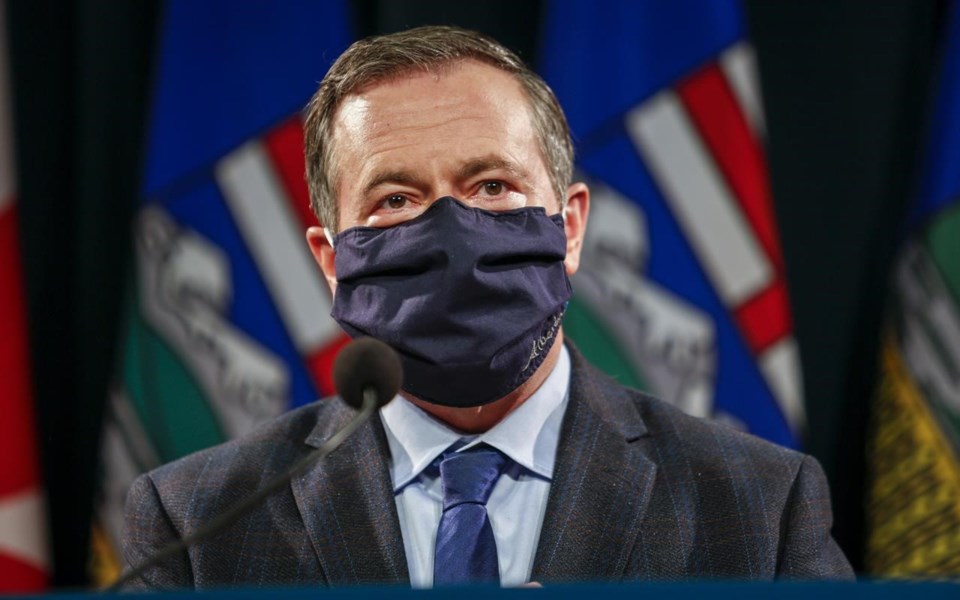CALGARY — Alberta Premier Jason Kenney says COVID-19 vaccine bookings have nearly tripled in the province since he announced a passport system.
Kenney said in a Facebook live video that nearly 25,000 vaccine appointments were recorded by Thursday night.
The government's “restrictions exemption program” allows businesses and venues to operate without capacity limits and other public health measures if they require proof of vaccination or a negative test result from anyone entering.
"This is a crisis of the unvaccinated. That is not to stigmatize people but to point out that individual choices have broader social consequences," Kenney said in the video.
"If you choose not to become vaccinated, you are taking the risk of higher level of transmission to people, including the vulnerable, but also a much, much higher risk of hospitalization."
On Friday, the government said 28,158 COVID-19 shots were given on Thursday, which it called a "sharp rise" from 9,750 shots the day prior.
Eighty per cent of eligible Albertans have received their first dose of vaccine and 72 per cent are fully immunized.
The passport program is to start Monday and is not mandatory.
Kenney had opposed a vaccine passport over what he said were privacy concerns, but now says it has become a necessary measure to protect Alberta's overwhelmed hospitals.
The province reported 2,020 new cases Friday, bringing active infections to 19,201. The province had not exceeded a single-day cases count over 2,000 since early May.
There were 911 people hospitalized for COVID-19, including 215 in intensive care.
Prior to the passport program, the United Conservative government launched two lotteries and a $100 incentive program to encourage vaccine uptake, which Kenney said resulted in small upticks.
Lorian Hardcastle, a health law and policy professor at the University of Calgary, said Alberta's program is likely to encourage vaccine uptake, but a broader and succinct model would have been more effective.
Having the option to opt-outof the program, and with rules varying across different settings, it's "hard to keep it all sorted in your mind," she said.
"The more layers of complexity you have, the harder it is for people to understand, and then you run into compliance and enforcement problems."
The bigger issue with Alberta's COVID-19 response is how responsibility has been off-loaded on businesses, municipalities and schools to make their own public health decisions, Hardcastle added.
Sarah Mackey, with Vaccine Hunters Alberta, a volunteer-driven group that directs Albertans to available vaccine appointments, said they are receiving tons of messages from people asking how they can help their friends book jabs.
In conjunction with the new passport system, Mackey said Alberta Health Services should increase outreach, access and education for people who are now considering getting vaccinated.
“It definitely feels, right now, like it's harder to access vaccines than it was in the spring, even though the people who are still waiting to be vaccinated are the ones who need it to be as easy as possible,” said Mackay.
“So we would love to see AHS having more walk-in hours available (and) different schedules for people who maybe work shift work or have unpredictable schedules … we know from past experience that it’s going to be marginalized people who are the least likely to have access and will be struggling.”
NDP Opposition Leader Rachel Notley is urging Kenney's United Conservative government to do more to support small business owners who plan to use the passport system.
“Businesses have endured through so much during this pandemic. Their bottom lines have been hammered," said Notley.
"There is absolutely no reason for the UCP to stall or refuse to provide them funding and enforcement support right now, especially if they are genuine in their push for a vaccine passport system that keeps Albertans safe."
The NDP is pressing the government to reintroduce a grant to support the hiring of additional staff and to pass a ministerial order to allow peace and bylaw officers to enforce restrictions, with a fine of up to $3,600 for non-compliance.
This report by The Canadian Press was first published Sept. 17, 2021.
Alanna Smith, The Canadian Press



